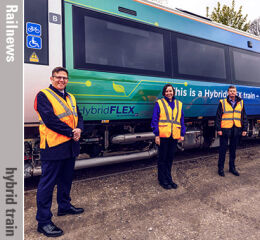Posted 10th February 2022 | 5 Comments
Chiltern introduces hybrid battery train

A HYBRID diesel-battery train is about to start carrying passengers on Chiltern Railways. The HybridFLEX, a converted two-car Class 168 unit fitted with a Rolls Royce MTU hybrid drive, is the product of a four-year partnership between Chiltern Railways, Porterbrook and Rolls-Royce.
The train is the first battery-diesel in Britain which is capable of running at 160km/h (100mph).
Chiltern said the batteries would reduce diesel consumption by 25 per cent and also cut carbon emissions and other pollutants. The battery mode is mainly being used while arriving and departing at stations.
The unit is running initially between London Marylebone and Aylesbury, but is also expected to run on the London-Oxford route within a few months.
Class 168s were originally introduced by Chiltern in 1998 under the brand name 'Clubman' and were built by ADtranz, which became part of Bombardier in 2001. They were the first new passenger trains to be launched following the start of franchises in 1996 and 1997, and have remained in service with Chiltern ever since.
Chiltern Railways managing director Richard Allan said: 'Chiltern Railways is determined to operate a railway that is as sustainable and environmentally friendly as possible. We have worked hard with our partners to fit a powerful battery power pack underneath a 20-year old diesel train to make the train cleaner, quieter and quicker.
'We are really proud that this concept train is now carrying customers and look forward to assessing its performance in daily service.'
Reader Comments:
Views expressed in submitted comments are that of the author, and not necessarily shared by Railnews.

david c smith, Bletchley
Just to qualify the advocy of combining a gas turbine with a battery - electric transmission, as described earlier.
Of course, this only makes "green"sense with use of appropriate fuel ; if it becomes feasible to use hydrogen, then the combustion process produces only water vapour ( steam) . Even natural gas usage would cut greenhouse gas production.
I understand these technologies have been experimented with in Russia and North America (?).
david c smith, Bletchley
Talking about "with battery"powering,I'm reminded of the attempts with gas turbines for rail traction. These all got shelved, although gas turbines are smaller, lighter and simpler than diesels, because they are only efficient when at "full load".
But if there were a battery / energy storage device in the transmission, the turbine could run at its most efficient setting until the battery gets full with stored energy,and it shuts down until next needed.
david c smith, Bletchley
Perhaps what matters most is Value for money, rather than absolute amounts spent? If Chiltern can achieve significant extra benefit through a pretty modest investment, then why not ?
Or, put another way, where major investments are involved, it is still important to get as many "bangs for their bucks" as feasible ; unfortunately this too often doesn't happen, for example due to not having a steady , rolling electrification programme, but with electrfication happening in "fits and starts" .I just wonder sometimes what the money that would have been saved if the GW electrification had been done for the original qoute, could have been invested in.
Nick Fowles, Todmorden
The story sums up the lack of vision and stupidity of a fragmented, rudderless railway network.
Take a 20 year old train that should be nearing the end of its working life. Spend 4 years cobbling together a battery/Deisel solution to reduce diesel consumption by 25% (hopefully) rather than electrify a high intensity, pretty enclosed commuter network linking our capital and Birmingham via prime commuter belt.
A third world solution in a first world country
Chris Neville-Smith, Durham, England
Might be a stupid question, but how are these trains charged? There aren't many opportunities to pick up electricity on the Chiltern Line.
[The batteries are recharged by regenerative braking.--Ed.]